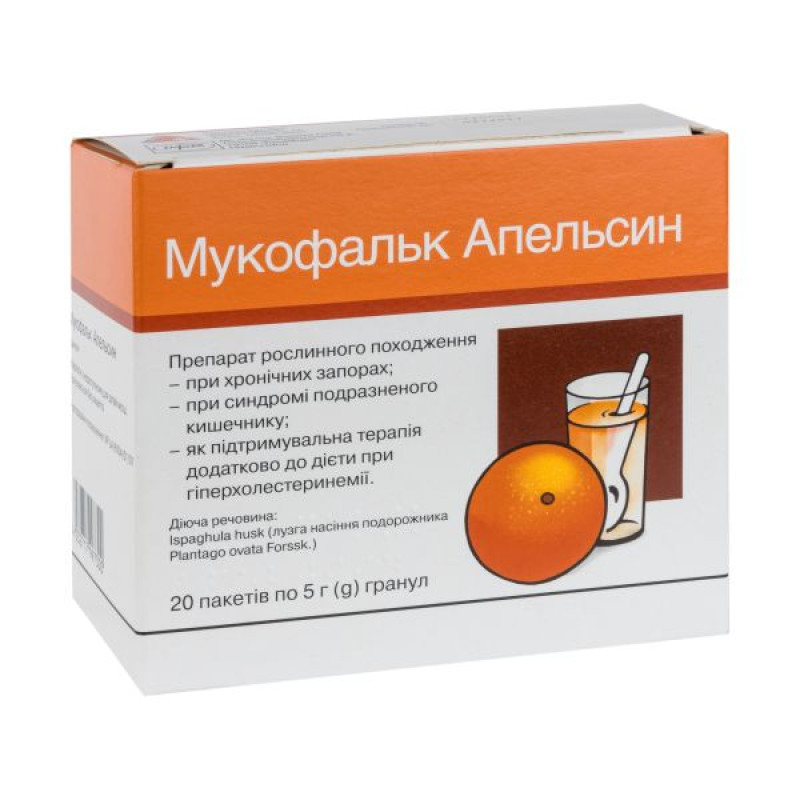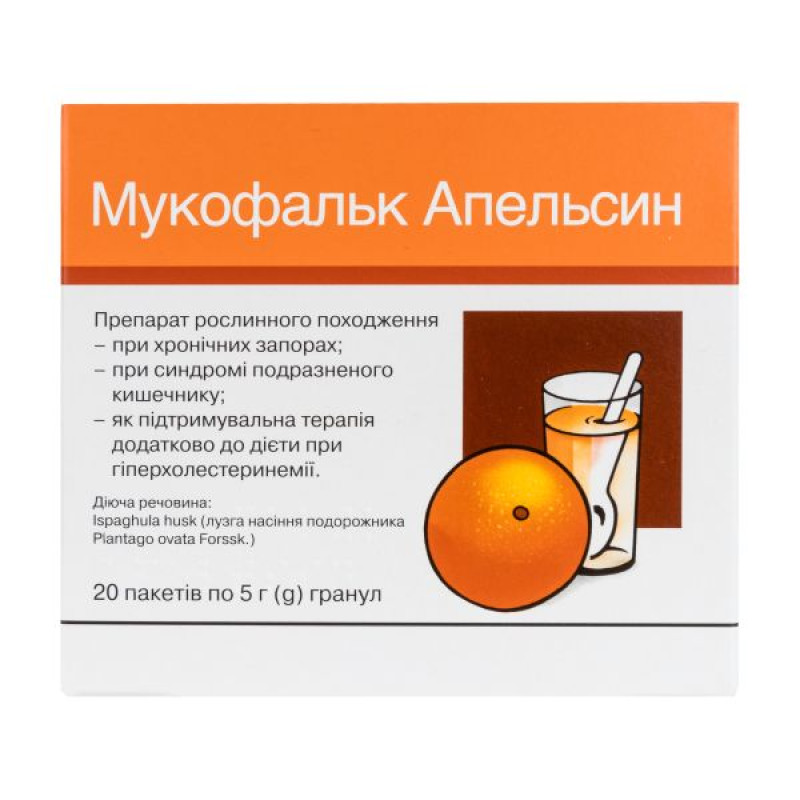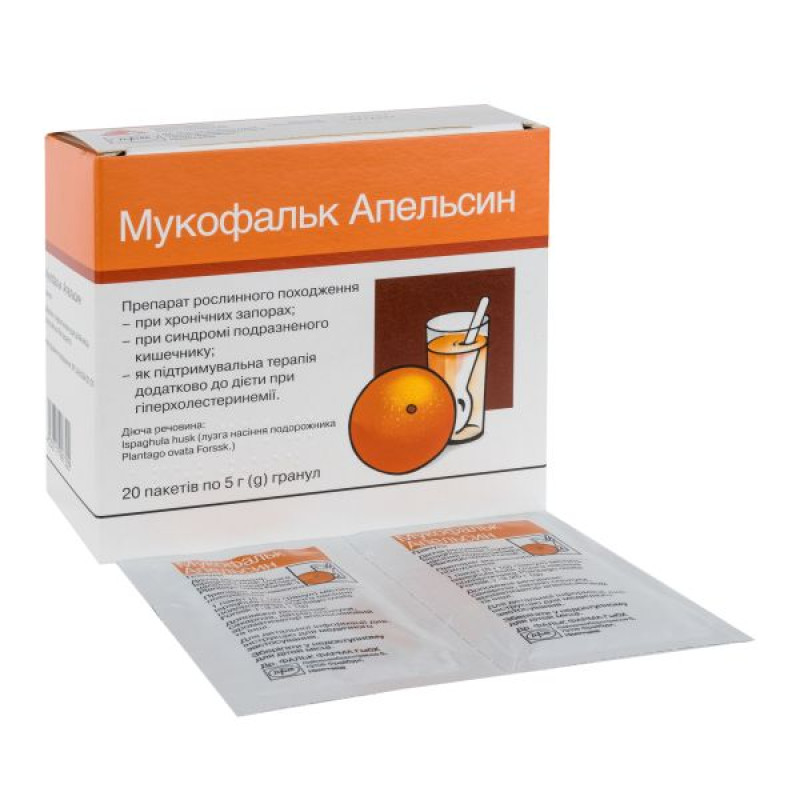Mukofalk orange granules sachet 5 g No. 20

Instructions for Mukofalk orange granules sachet 5 g No. 20
Composition
active ingredient: Ispaghula husk (Plantago ovata Forssk. seed husk)
1 packet (5 g of granules) contains Ispaghula husk (Plantago ovata Forssk. seed husk) – 3.25 g;
excipients: sucrose, dextrin, anhydrous citric acid, sodium alginate, sodium citrate, sodium chloride, sodium saccharin, orange flavoring.
Dosage form
Granules.
Main physicochemical properties: beige granules with brown particles of epidermis and adjacent destroyed layers, removed from dried mature seeds of plantain Plantago ovata Forssk.
Pharmacotherapeutic group
Laxatives. Means that increase the volume of intestinal contents. Preparations from the seeds of plantain.
ATX code A06A C01.
Lipid-modifying agents. ATX code C10A X.
Pharmacological properties
Pharmacodynamics.
The active ingredient is plantain seed husk, which consists of the epidermis and adjacent destroyed layers removed from the dried mature seeds of Plantago ovata Forssk. (Plantago ispaghula Roxb.). Plantain seed husk is particularly rich in dietary fiber and mucilage, the mucilage content being much higher than in other Plantago species.
The active ingredient of the drug absorbs approximately 40 times its own weight in water. It consists of 85% water-soluble fibers and is partially enzymatic (in vitro 72%-uncompacted residue) and acts by hydrating the stool.
Intestinal motility and transit rate can be modified by the seed husk, which causes mechanical distension of the intestinal walls. This occurs due to an increase in intestinal volume and a decrease in the viscosity of the luminescent contents due to the absorption of water.
If taken with plenty of liquid, the seed husk increases the volume of intestinal contents due to the high bulking properties of the husk and, as a result, an irritating distension that causes defecation. In turn, the swollen mass of mucous forms forms a lubricating layer that facilitates the transit of intestinal contents.
Onset of action: Psyllium husk usually acts as a laxative within 12–24 hours of a single administration. Sometimes the maximum effect is not achieved until 2–3 days later.
In mild to moderate hypercholesterolemia, a decrease in LDL (low-density lipoprotein) cholesterol of approximately 7% has been observed. There is no data on the effect of psyllium seed husk on the incidence of cardiovascular complications and overall mortality.
Indication
Chronic constipation;
diseases in which soft, facilitated bowel movements are desirable, such as anal fissures, hemorrhoids, as well as the condition after surgery in the rectal area;
irritable bowel syndrome;
used as a maintenance therapy in addition to diet for hypercholesterolemia.
Contraindication
Known hypersensitivity reaction to Ispaghula (Plantago, Psyllium), as well as hypersensitivity to any of the components of the drug;
any sudden change in bowel habits that lasts more than two weeks;
taking a laxative with no bowel movement;
rectal bleeding of unknown etiology;
difficulty swallowing or other problems with your throat or swallowing;
stenosis of the esophagus, cardiac orifice of the esophagus or other parts of the gastrointestinal tract;
Risk of developing or existing intestinal obstruction (ileus) or megacolon; intestinal paralysis.
Special safety precautions
Mucofalk Orange should be taken with sufficient liquid (minimum 150 ml) per 1 sachet (5 g). Taking the medicine without sufficient liquid may cause difficulty in swallowing or lead to choking. Mucofalk Orange should not be taken while lying down or immediately before going to bed.
Interaction with other medicinal products and other types of interactions
There should be a break of approximately 30-60 minutes between taking Mukofalk Orange and other medications, as the intestinal absorption of other medications that the patient is taking at the same time, such as minerals (e.g. calcium, iron, zinc), vitamins (vitamin B12), lithium, cardiac glycosides, coumarins and carbamazepine, may be slowed.
Bulking agents and drugs that inhibit natural intestinal peristalsis (e.g. loperamide, opium tincture) should not be used concurrently with this medication as intestinal obstruction may develop.
Patients with diabetes may require adjustment of antidiabetic treatment when taking Mukofalk Orange. The effect of thyroid hormones may be weakened, even if they are not used simultaneously.
Application features
The use of psyllium seed husk as a dietary support therapy for hypercholesterolemia requires medical supervision.
When using the drug Mukofalk Orange, it is necessary to ensure the intake of sufficient fluid, at least 150 ml of water per 1 sachet.
If insufficient fluid intake is achieved, bulking agents can cause obstruction of the throat and esophagus with choking and intestinal obstruction. Symptoms may include chest pain, vomiting, or difficulty swallowing or breathing.
In diarrhea, the most important aspect of treatment is restoring electrolyte balance.
Mucofalk Orange should not be taken by patients with bowel problems and symptoms such as abdominal pain, nausea and vomiting. These symptoms may be signs of an existing or possible intestinal obstruction.
Patients taking Mukofalk Orange for the treatment of chronic constipation should discontinue treatment with the drug and consult a doctor if they experience abdominal pain or irregular stool consistency.
Debilitated and elderly patients should be monitored during treatment.
Mucofalk Orange contains sucrose; therefore, the medicinal product should not be used in patients with hereditary fructose intolerance, glucose-galactose malabsorption syndrome or congenital sucrase-isomaltase insufficiency.
One dose of Mukofalk Orange (5 g) contains 0.5 g of sucrose (sugar) and 3.07 kcal (12.86 kJ), which is equivalent to 0.064 exchangeable carbohydrate units.
One dose of Mukofalk Orange (5 g) contains 3.9 mmol (90 mg) of sodium. This should be taken into consideration by patients on a low-sodium/low-salt diet.
Use during pregnancy or breastfeeding
There are no contraindications to the use of Mukofalk Orange during pregnancy or breastfeeding.
There are only limited data (less than 300 pregnancy outcomes) on the use of the drug during pregnancy. Animal studies are insufficient to draw conclusions on reproductive toxicity.
The drug can be used during pregnancy and lactation if necessary or if there is no effect from changing the diet. It is necessary to perform a bowel cleansing procedure before using other laxatives.
The ability to influence the reaction speed when driving or working with other mechanisms
No effect on the ability to drive or use machines was observed.
Method of administration and doses
Unless otherwise prescribed, the following recommendations for use must be followed, otherwise Mukofalk Orange will not have a therapeutic effect!
For chronic constipation and diseases in which easier bowel movements are desirable, adults and children over 12 years of age should take 1 sachet (5 g) of Mukofalk Orange 2–3 times a day after mixing in a sufficient amount of liquid (at least 150 ml per sachet).
If the drug is intended as an aid for diarrhea or irritable bowel syndrome, or for hypercholesterolemia, use 1 sachet (5 g), dissolved in a sufficient amount of liquid (at least 150 ml per sachet), 2-6 times a day.
If the patient has prolonged constipation and irregular bowel movements lasting more than 3 days, or diarrhea lasting more than 2 days and accompanied by blood or fever, a doctor should be consulted.
Recommendations for use:
1. Never use this medication dry as it may cause difficulty swallowing.
2. Pour the granules from the bag into an empty glass.
3. Slowly fill the glass with cold water (at least 150 ml).
4. Stir with a spoon and, making sure there are no lumps left, drink immediately. Do not take while lying down or right before bed!
5. Then drink another glass of water.
The effect of using Mukofalk Orange is usually observed 12-24 hours after taking it.
Take Mukofalk Orange during the day at least half an hour before or after taking other medicines.
When used for maintenance therapy for moderately elevated cholesterol levels, it is recommended to take Mukofalk Orange with food.
If the patient forgets to take the drug, treatment should be continued according to the dosage recommendations, but the dose should not be increased.
Before interrupting or discontinuing treatment, it is advisable to consult a doctor.
Children
Mukofalk Orange should not be used in children under 12 years of age due to insufficient experience with the drug in patients of this age group.
Overdose
If the patient has taken a higher than recommended dose of the drug, side effects such as abdominal pain, flatulence or an increased feeling of fullness in the intestines may occur. First of all, it is necessary to drink enough fluids. If necessary, the doctor should prescribe symptomatic therapy.
Side effects
Flatulence and a feeling of fullness in the intestines are possible, but they usually disappear during further treatment.
Abdominal bloating and problems with bowel movements are possible, and there is also a risk of intestinal or esophageal obstruction, especially if insufficient fluid intake is achieved.
Psyllium seed husk contains allergens that may cause hypersensitivity reactions through oral administration or skin contact. Symptoms of hypersensitivity reactions may include rhinitis, conjunctivitis, bronchospasm, and occasionally anaphylactic shock. Skin reactions such as exanthema and pruritus have also been reported.
The frequency of these side effects is unknown.
Expiration date
Do not use after the expiration date indicated on the package.
Storage conditions
Keep out of reach of children.
Packaging
5 g of granules per bag. 20 bags per carton.
Vacation category
Without a prescription.
Producer
Dr. Falk Pharma GmbH, Germany.
Address
Leinenweberstrasse 5, 79108 Freiburg, Germany.
There are no reviews for this product.
There are no reviews for this product, be the first to leave your review.
No questions about this product, be the first and ask your question.









